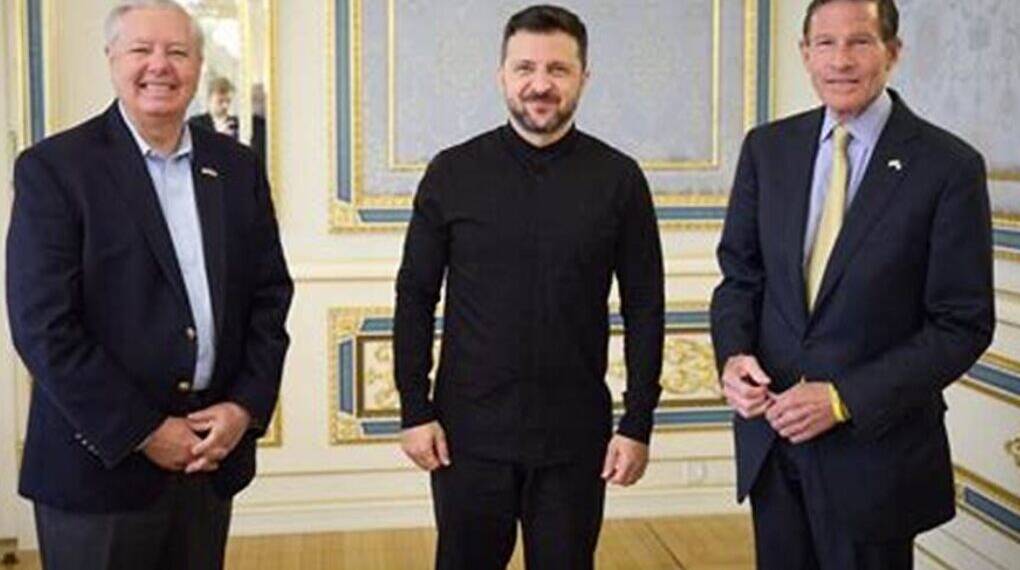A high-profile visit by US Senators Lindsey Graham (R-SC) and Richard Blumenthal (D-CT) to Ukraine this week underscored growing bipartisan frustration in Washington with Russia’s ongoing military aggression and a perceived lack of progress in peace negotiations. The senators’ meeting with President Volodymyr Zelensky came just days after a major Russian aerial assault and ahead of a much anticipated, but increasingly uncertain, round of peace talks in Istanbul.
The senators used their visit to promote new bipartisan sanctions bill that targets nations purchasing Russian energy exports. The bill, already supported by over 80 senators, proposes a dramatic 500% tariff on goods from countries that continue to buy Russian oil, gas, and uranium—an effort aimed at cutting off financial support for Moscow’s war efforts. Despite widespread Senate backing, the bill’s future remains unclear, with President Donald Trump yet to endorse it. Speaking to reporters, Trump said, “I’ll have to see it,” when asked if he would sign the bill.
The visit and sanctions push come amid a broader climate of frustration in Washington, including within the Trump administration. While Trump has held back from imposing new sanctions in hopes of brokering a peace deal, recent comments suggest a shift in tone. “We’re in the middle of talking, and [Putin]’s shooting rockets into Kyiv,” Trump said recently, expressing disappointment in Russia’s failure to reduce hostilities during negotiations.
Yet, back home, Graham’s visit sparked fierce backlash from figures within Trump’s own political base. Steve Bannon, the former White House chief strategist and influential voice in the MAGA movement, publicly called for Graham to be jailed or barred from reentering the US, accusing him of “stirring it up” in Kyiv and undermining Trump’s diplomatic strategy. “Either cancel his passport and don’t let him back in the country, or put him in jail if he comes back,” Bannon declared in a NewsNation interview.
Bannon’s comments reflect a growing divide within the GOP over Ukraine policy. While mainstream Republicans like Graham continue to support Ukraine’s defense and press for stronger measures against Russia, a populist segment of the party increasingly questions US involvement in the conflict. This rift has been amplified by Ukraine’s recent drone attacks inside Russian territory, which some on the far right allege are escalating tensions deliberately—possibly even implicating US intelligence in orchestrating the actions.
Also read: More Spider web operations for Zelensky, UK to deliver 100,000 drones to Ukraine
At the heart of the political tension is a fundamental question: how should the US balance diplomacy and deterrence in a prolonged, grinding war where clear victory or resolution remains elusive? Zelensky, for his part, emphasized the need for clarity ahead of Monday’s proposed talks in Istanbul. “For a meeting to be meaningful, its agenda must be clear,” he said, pointing out that Russia has yet to provide its expected memorandum of proposals.
While Ukraine has submitted its own peace outline, skepticism lingers over whether Russia is serious about negotiation. Russian Foreign Minister Sergey Lavrov insists Moscow will deliver its memorandum at the talks, but trust remains low following Russia’s absence at earlier high-level meetings.
Meanwhile, hopes for broader international coordination on peace talks have emerged, with Zelensky and Turkish President Recep Tayyip Erdoğan reportedly discussing the possibility of a four-way summit involving Ukraine, Russia, Turkey, and the United States.
Despite the political turbulence, the senators’ visit represents a clear signal of continued US engagement in Ukraine’s defense and long-term security. Whether this approach will align with Trump’s evolving foreign policy remains uncertain—especially as internal divisions within the GOP over Ukraine deepen.
As the conflict grinds on into its fourth year, the tension between war strategy and domestic political calculation continues to shape not just American foreign policy, but the credibility and unity of its political leadership on the global stage.








